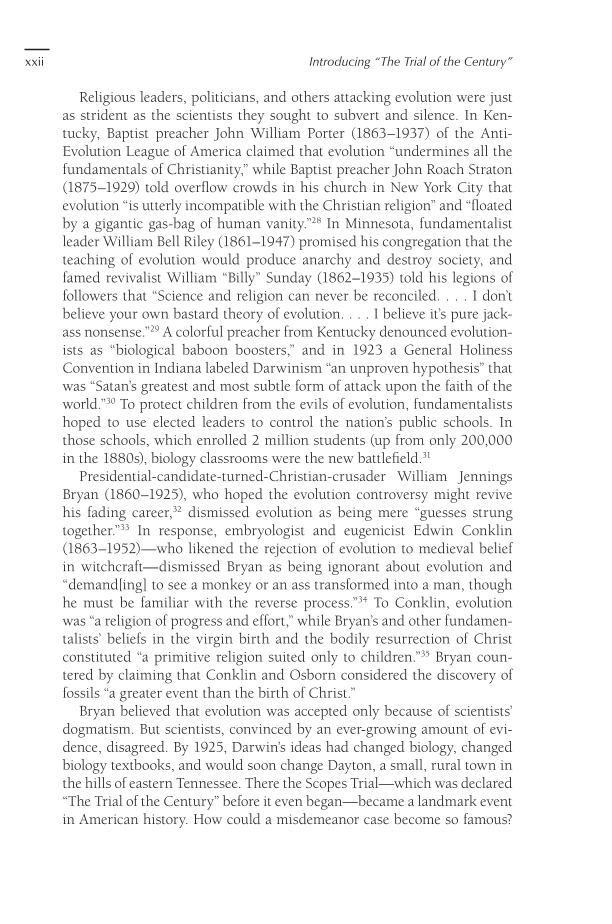xxii Introducing “The Trial of the Century” Religious leaders, politicians, and others attacking evolution were just as strident as the scientists they sought to subvert and silence. In Ken- tucky, Baptist preacher John William Porter (1863–1937) of the Anti- Evolution League of America claimed that evolution “undermines all the fundamentals of Christianity,” while Baptist preacher John Roach Straton (1875–1929) told overflow crowds in his church in New York City that evolution “is utterly incompatible with the Christian religion” and “floated by a gigantic gas-bag of human vanity.”28 In Minnesota, fundamentalist leader William Bell Riley (1861–1947) promised his congregation that the teaching of evolution would produce anarchy and destroy society, and famed revivalist William “Billy” Sunday (1862–1935) told his legions of followers that “Science and religion can never be reconciled. . . . I don’t believe your own bastard theory of evolution. . . . I believe it’s pure jack- ass nonsense.”29 A colorful preacher from Kentucky denounced evolution- ists as “biological baboon boosters,” and in 1923 a General Holiness Convention in Indiana labeled Darwinism “an unproven hypothesis” that was “Satan’s greatest and most subtle form of attack upon the faith of the world.”30 To protect children from the evils of evolution, fundamentalists hoped to use elected leaders to control the nation’s public schools. In those schools, which enrolled 2 million students (up from only 200,000 in the 1880s), biology classrooms were the new battlefield.31 Presidential-candidate-turned-Christian-crusader William Jennings Bryan (1860–1925), who hoped the evolution controversy might revive his fading career,32 dismissed evolution as being mere “guesses strung together.”33 In response, embryologist and eugenicist Edwin Conklin (1863–1952)—who likened the rejection of evolution to medieval belief in witchcraft—dismissed Bryan as being ignorant about evolution and “demand[ing] to see a monkey or an ass transformed into a man, though he must be familiar with the reverse process.”34 To Conklin, evolution was “a religion of progress and effort,” while Bryan’s and other fundamen- talists’ beliefs in the virgin birth and the bodily resurrection of Christ constituted “a primitive religion suited only to children.”35 Bryan coun- tered by claiming that Conklin and Osborn considered the discovery of fossils “a greater event than the birth of Christ.” Bryan believed that evolution was accepted only because of scientists’ dogmatism. But scientists, convinced by an ever-growing amount of evi- dence, disagreed. By 1925, Darwin’s ideas had changed biology, changed biology textbooks, and would soon change Dayton, a small, rural town in the hills of eastern Tennessee. There the Scopes Trial—which was declared “The Trial of the Century” before it even began—became a landmark event in American history. How could a misdemeanor case become so famous?
Document Details My Account Print multiple pages
Print
You have printed 0 times in the last 24 hours.
Your print count will reset on at .
You may print 0 more time(s) before then.
You may print a maximum of 0 pages at a time.

























































































































































































































































































































